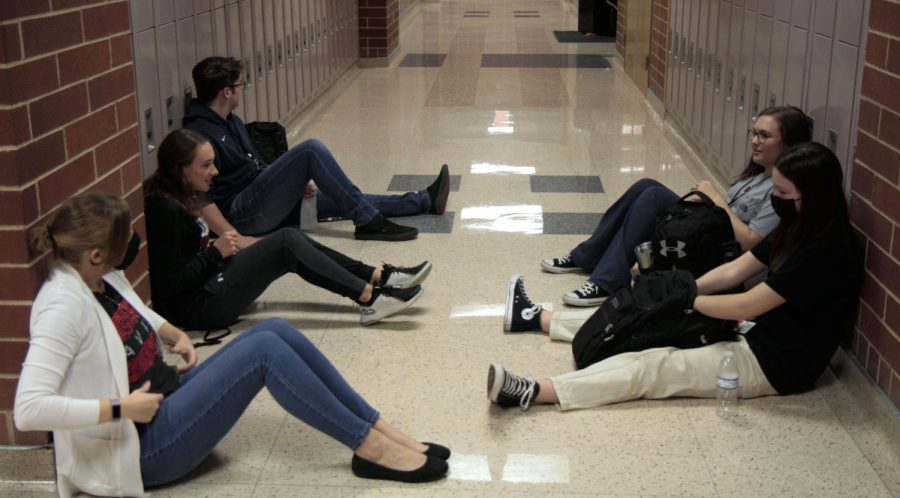The sun barely peeks over the three-story building as Coach Christopher McMullen pulls up to the school, taking a breath and preparing for the long day ahead of him.
“There is so much that goes on behind the scenes,” Coach McMullen said. “I thought it would be as simple as coming to school to teach class, go coach and then go home.”
However, teaching did not come so simple for the new teacher at the time. Instead, Coach McMullen lesson plans with other teachers, fills out paperwork for various things and weighs thoughts on how to teach best to his students.
“I have to have good teachers to give kids those tools and skills they need,” Dr. Butler, principal, said. “If you’re not a good teacher, then you’re not going to build relationships and you’re not going to give good content.”
Like Coach McMullen and Dr. Butler, to become a teacher in the state of Texas requires a multitude of steps. First, they have to earn a bachelor’s degree then they take content tests and eventually pass the certification exam. Once years have been poured into becoming a licensed teacher, they finally get to put their education into practice. However, teaching deems to be more difficult than most realize.
“I would pay [teachers] more,” Dr. Butler said, “because they are professionals just like dentists and doctors. At least a $100,000 a year—I’d even pay them more because they deserve it.”
On top of it all, teachers in Texas make an average of $59,397 a year. CEO’s on the other hand make an average of $13.9 million a year but also teach lessons, develop plans, make decisions regarding their workers, fill out paperwork and stay late hours. Comparing the two professions is a stretch, but their duties correlate yet one is paid by the millions while the other can’t hit six figures. Teachers also handle problematic students, student paperwork to teacher ratio, long hours, and now COVID-19 protocols.
“It’s frustrating,” Coach McMullen said. “It’s frustrating dealing with kids who are having to get back into a structured setting. They [students] don’t want to do what they’re supposed to do and few cause stress and problems. The majority of kids are great kids, but like you got 10% of kids causing 90% of the problems.”
Now with COVID-19, one in four American teachers consider leaving their job. COVID-19 brought out rising levels of stress and anxiety, extra health concerns, heightened risks to at-home issues and lack of socialization. With the already faltering education system, the pandemic added extra stressors causing teachers to drop school and pursue higher-paying and less tense jobs. However, we need teachers. This year at Legacy, five teachers left. Four of them left to work in the business world and only one left for personal reasons.
“Teachers can instill confidence in your abilities that maybe nobody else can,” Coach McMullen said. “They can further your interest in subjects and open your eyes to other areas that you didn’t realize you might have a strong skill set.”
Teaching, despite its underappreciation, can come with fulfillment. Teachers have the opportunity to help a student figure out their career choice, assist in their life issues, build relationships and set a good example for their students.
“They have to know that you care about them as a person and that they know I understand they have a life outside of school,” Coach McMullen said. “Understanding that and nursing what drives them creates natural conversations throughout the year that you can have with them and through that build a relationship.”
In a classroom setting teachers set the tone for their students. In fact, students and teachers with good relationships end up performing better in class. Students tend to have more “prosocial” behaviors such as cooperation and compassion.
“Then when they come to class, they’re more likely to listen when it’s my time to teach,” Coach McMullen said. “When it’s time to do their work, they’re more likely to engage and do what they’re supposed to.”
Teachers who support and build bonds in return help students appreciate school and retain the content taught to them. When students like senior Cora Lewis understand their classes they are better qualified for the world in education and life skills.
“Good teachers are able to help us by being honest and accepting,” Lewis said. “I think they need to be willing to teach their students about things that we won’t get in every required class we take in high school. This way, we as students, are able to go out in the world and thrive in whatever profession we choose.”
Teachers make an impact. They help build students up to become the future of the world but don’t gain as much credit as they should. Though this job comes with a cost, teachers can influence a student in a way other people don’t have the chance to.
“[To be a teacher] it has to be something you’re passionate about or it will be difficult to make a career of it,” Coach McMullen said. “Building relationships with students and helping them succeed is at the core of every good teacher.”





